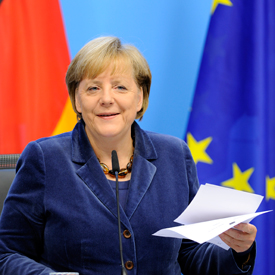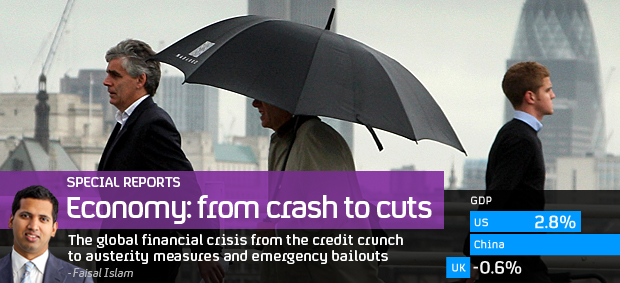Has Angela Merkel won over Germany?
Only weeks ago, Germans were debating her leadership abilities. But with Germany placed to dominate Europe, has Chancellor Angela Merkel won over her detractors?

The bailout fund has been a contentious issue in Germany – perhaps unsurprisingly, Angela Merkel has had a tough job convincing the German public that the country should foot the bill for its debt-ridden neighbours. Hours before the Brussels summit, Chancellor Merkel was feeling the heat from politicians in parliament about the terms of the bailout.
One economist told Channel 4 News that Merkel was particularly vulnerable because she has had to risk her own re-election.
But Merkel managed to get her way on a number of crucial details, especially in her insistence that the European Financial Stability Facility (EFSF) fund should not be allowed to run up debt. Instead, a German model that leverages the fund to provide insurance on bonds, has been put in place – the greater the leverage, the higher the likelihood of actual losses.
Merkel’s comeback?
News of the eurozone bailout fund has been welcomed today in Germany. Opposition leaders had already approved her proposal, but the national Spiegel newspaper ran a glowing editorial praising Ms Merkel for her slow, but steady pace in negotiations. Editor Roland Nelles, wrote that she had managed to avoidbeing panicked by the markets and that her approach was the main factor in the deal’s success.
Ms Merkel has transformed herself from a leader merely reacting to events into one who now designs steps to control those events. Roland Nelles, Spiegel newspaper
“Ms Merkel has transformed herself from a leader merely reacting to events into one who now designs steps to control those events,” he wrote.
While others might “plow [sic] ahead like a bull in a china closet,” Ms Merkel is cautious and considered. “And whereas the public and the markets can sometimes succumb to panic, Merkel has a tendency to decelerate.”

Germans remain pro-European
While she has her backing from the political elite in the wake of the deal, the reaction from the German public is harder to read. Not to the same extent as the rest of the eurozone, but Germans have been struggling with few jobs and additional taxes, says Siobhan Dowling, Berlin-based journalist and blogger.
“Unemployment figures have gone down in recent years, but now there a sense of concern that if this goes wrong, Germany will be left holding the can,” Ms Dowling told Channel 4 News. “However there’s a sense that she has achieved something – she wasn’t pushed into something that she didn’t want to do.”
The centre-right Free Democratic Party (FDP) has been peddling a euro-sceptic message in the midst of the eurozone crisis. “There is a perception that Germany is paying for other state’s lack of ability to keep their finances in order,” said Ms Dowling, but whether this will be popular with the public remains to be seen.
There may have been nostalgia for the deutschmark amid the euro crisis, but this is now likely to recede, Ms Dowling told Channel 4 News. “From what I’ve read and seen, Germans are still very pro-European. It’s seen to be part of ensuring peace and being part of the EU community,” she said.
A ‘German Europe’
Whatever happens on the streets on Germany once the details of the bailout fund are confirmed, Germany’s position at the head of Europe will be confirmed. Following the announcement of a signed and sealed agreement, Paul Waugh, editor of Politics Home, has warned that we are now looking at a “German Europe”, and suggests that Downing Street and the Treasury would be right to be “nervous” about the deal.
The landmark eurozone deal also marks the resurgence of Germany’s dominance of the EU, he writes.
“The Germans will now clearly have more of a say in imposing the financial discipline that the euro was meant to have imposed on the southern states. It pays the bills and its bond market rating gives the euro its necessary fiscal rectitude.”
